In today’s digital age, maintaining a positive reputation is paramount for businesses and individuals alike. Online perceptions can significantly impact credibility, trust, and success. Reputation software, a powerful and sophisticated tool, has emerged as the go-to solution for managing and enhancing one’s reputation in the virtual realm. With its array of features and functionalities, reputation software empowers users to monitor, analyze, and influence their online presence, ensuring they leave a lasting, positive impression on their audience. Whether it’s a brand safeguarding its image or an individual building a strong online identity, reputation software is the essential tool for navigating the ever-evolving landscape of public perception.
What is Reputation Software?
Reputation management software enables business managers and owners to effectively monitor their brand’s reputation through tracking reviews, comments, and brand mentions across social media platforms, review sites, and other online channels. It simplifies the process of soliciting customer reviews, which are crucial for maintaining a prominent presence in the industry. Additionally, this software assists businesses in addressing negative feedback on platforms like Facebook and Google, providing valuable insights on how to handle any arising issues. Some tools even offer features to oversee and update online listings and directories, ensuring the accuracy and currency of business information.
Benefits of Using a Reputation Management Software:
- Trust means sales: Building trust with your audience is crucial for driving sales. Positive online reviews play a vital role in establishing trust in your brand. People often rely on the latest reviews when making purchasing decisions. Continuous influx of new positive reviews indicates active customer engagement and satisfaction, which instills confidence in potential buyers.
- Influence the decision-making process: Online reviews heavily influence the decision-making process of consumers. A single outstanding review can attract customers to your business and generate sales. Conversely, a single negative review can deter prospective customers. It is crucial to be vigilant about the timing and reasons behind negative reviews to address any issues promptly and mitigate potential damage.
- SEO and listings: Search engines like Google prioritize businesses with a strong emphasis on providing a quality customer experience. A robust online presence across business listing websites demonstrates to search engine algorithms that you prioritize customer satisfaction. This can result in higher rankings in search results, as search engines view your brand as deserving of visibility. Since a vast majority of users do not go beyond the first page of search results, ranking on the first page holds significant value.
- Attracting potential clients: A positive online reputation serves as social proof and instills confidence in potential customers. It provides assurance that your products or services are reliable and trustworthy. Conversely, even a single negative review can deter new clients, particularly for emerging businesses. The impact of social media monitoring should not be underestimated, as it can significantly impact your brand’s reputation and success.
Top Reputation Management Softwares:
1. Brandwatch Consumer Intelligence
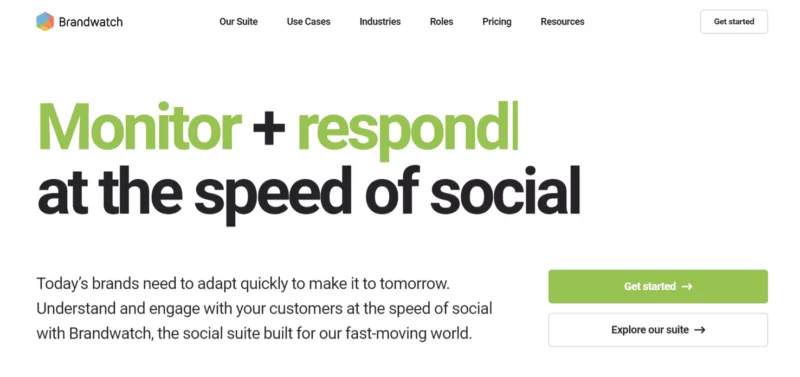
- Sentiment Analysis
- Trend Tracking
- Influencer Identification
- Report Customizability
- Social Analytics
Brandwatch Consumer Intelligence goes beyond being just a social media marketing platform. It provides comprehensive solutions for brands aiming to excel in the social media landscape, specifically in managing their online reputation and addressing critical issues. One of its notable features is a customizable and user-friendly interface, offering powerful search, filtering, labeling, and tracking capabilities. This empowers brands to effectively monitor and handle their online presence.
While it includes modules for publishing, engaging, advertising, audience analytics, measuring, and benchmarking, its social listening capabilities are beneficial for firms focused on managing their online reputation. Powered by Brandwatch, the Listen module keeps a close eye on brands across 100 million online sources. This allows users to identify emerging trends and extract valuable insights from online conversations.
Through Listen, you can keep updated in real-time with trends and discussions regarding your brand, products, and competitors, enabling you to respond promptly. It also helps you track mentions and gain an understanding of what resonates with and influences your customers. By utilizing AI, it can analyze sentiment and brand perception without the need to manually sift through extensive datasets. The seamless integration of the Listen module with Brandwatch’s unified social inbox, which can be tailored to your preferences, enables you to analyze, monitor, and take action based on insights gathered from social media platforms, forums, review sites, and other sources beyond social media.
Pros:
- Extensive monitoring of dozens of sources, going beyond social listening
- Utilizes a vast amount of data spanning 12+ years for powerful insights
- Impressive data visualization provides a quick overview of information
- Suitable for small, medium, and large businesses
Cons:
- Advanced boolean queries need to be manually typed
- The abundance of data and filtering options may be overwhelming for non-tech-savvy users
2. Digimind
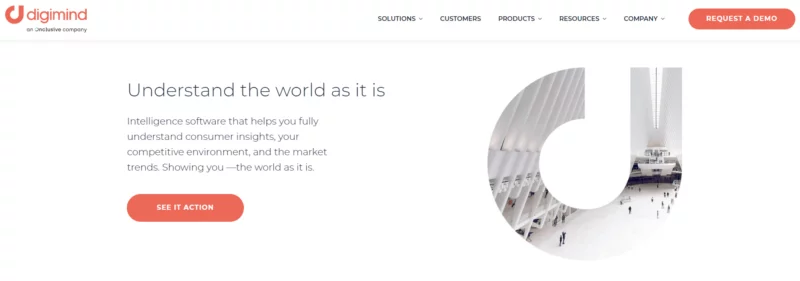
- Competitive Analysis
- Reputation Management
- Consumer Insights
- Influencer Identification
- Trend Tracking & Innovation
Digimind is a robust tool for managing and monitoring online reputation that provides a wide range of features to help brands gain a comprehensive understanding of their online presence and offerings. Despite its impressive functionality, the platform remains user-friendly and intuitive. Powered by AI, Digimind has earned the trust of prestigious companies like Lexus Asia Pacific and Renault.
With Digimind, you have the ability to track competitor brands and products, as well as monitor conversations surrounding your own brand and products on social networks. The platform offers impressive metrics and enables deep analysis to uncover valuable insights. Notably, its proprietary Natural Language Processing feature is capable of processing even slang, providing you with a comprehensive understanding of the online discourse.
By having access to this wealth of information, you can proactively identify and anticipate potential issues, allowing you to adapt your brand strategy accordingly. Digimind goes beyond simple online reputation management by empowering you to stay ahead of the game and take proactive measures.
Digimind adopts a customized pricing model, offering various packages ranging from per seat to volume-based options. Additionally, the platform provides demo sessions upon request.
Pros:
- Diverse integration options
- Comprehensive data collection
- Tracking trends and analyzing competition
Cons:
- Customer service response times can be slow
- Occasional glitches with LinkedIn integration
- Certain features may be confusing to navigate
3. YouScan
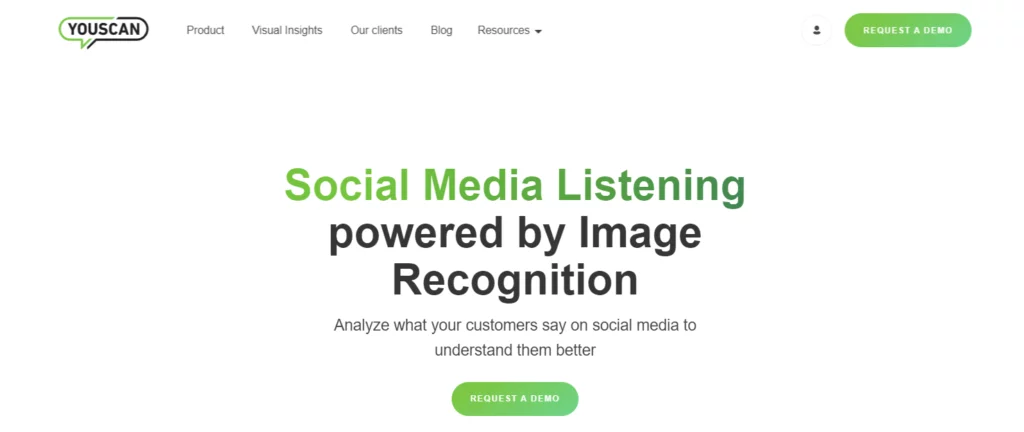
- Competitive Analysis
- Configurable Alerts
- Influencer Tracking
- Reputation Management
- Sentiment Analysis
YouScan is a fundamental tool for listening, capable of scanning social media and the entire web to identify brand mentions and analyze their broader social impact. It uncovers an extensive range of data points that users can explore, offering numerous methods to analyze the data. Its standout feature lies in its image recognition capabilities, enabling users to conduct highly specific visual searches.
To begin, you set up Boolean searches to locate the desired data. Once YouScan identifies relevant data based on your search criteria, you can access a page displaying all the collected mentions that match your criteria. The results can be filtered in various ways to focus on the most relevant information. Visual Insights allows you to conduct precise searches within the displayed images, thanks to the highly accurate AI engine powering the image recognition.
The analytics tools include interactive graphs and charts that portray the significant trends related to your chosen topics. By clicking anywhere on the charts, you can delve deeper and view the posts behind the numerical data.
Pros:
- Remarkable mentions search function
- User-friendly interface
- Easy keyword setup
- Smooth third-party integrations
Cons:
- High price points
- Limited customer service languages
4. BrandMentions

- Competitive Analysis
- Configurable Alerts
- Dashboard
- Impact Scoring
- Influencer Tracking
BrandMentions sets itself apart by offering comprehensive listening capabilities across various channels. Not only does it cover major social media platforms, but it also includes non-social websites such as news, blogs, and review sites.
To get started, you undergo a thorough configuration process where you define the keywords you want to track. This usually includes your company name and/or social handle, but you can also monitor your competitors’ keywords and social handles. Additionally, you have the flexibility to customize your project by specifying required or excluded keywords for more precise results. The platform provides sentiment analysis for each mention, allowing you to filter and organize your results accordingly.
Once your project is set up, you can quickly access a breakdown of your mentions in less than a minute. The results can be filtered in various ways, enabling you to pinpoint specific mentions for a more detailed analysis. Moreover, when it comes to social media posts, you have the convenience of responding directly from within its user interface.
Pros:
- Excellent user interface
- Automatic report scheduling
- Extensive filtering options
- Efficient mention tracking
Cons:
- Exclusive features for higher plans
- Slow loading process
5. BuzzSumo
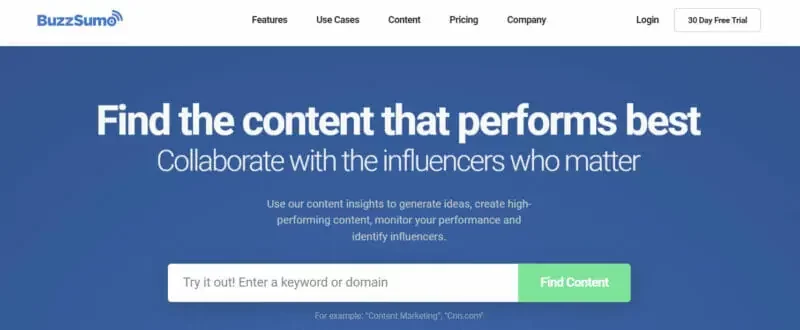
- Audience Segmentation
- Competitive Analysis
- Configurable Alerts
- Customer Engagement
- Dashboard
BuzzSumo offers a unique approach compared to other tools in this list. It allows you to search the web for content containing your specified search term and provides engagement metrics for each search result. You have the flexibility to apply various filters when performing searches, including date, B2B publishers, country, language, domain, content type, word count, and publisher size.
BuzzSumo provides engagement data for Facebook, Twitter, Pinterest, and Reddit, along with the total number of links received by each search result. The platform produces a comprehensive content analysis report with detailed graphs that primarily focus on engagement levels for articles related to your chosen topic.
For effective online reputation management, it enables you to create alerts for brand mentions, competitor mentions, content from specific websites, keyword mentions, backlinks, and specific authors. You can customize these alerts by setting inclusions/exclusions, specifying a minimum engagement threshold, and choosing the frequency of receiving alerts (instant, daily, or none).
Pros:
- Superb resources for constructing high-performing content
- Robust content recommendation tool
- User-friendly interface for effortless navigation
- Cons:
- Price points may be on the higher side
- Interface can become perplexing with the addition of more features
6. Mention
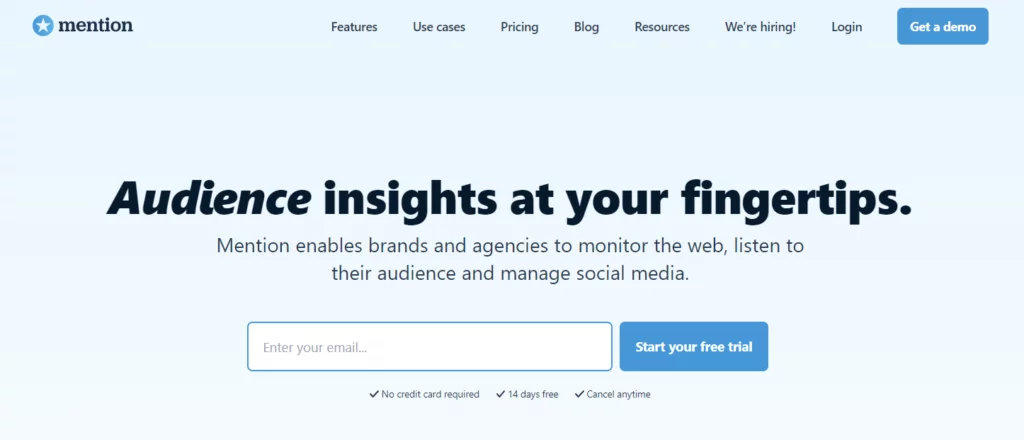
- Audience Segmentation
- Competitive Analysis
- Configurable Alerts
- Customer Engagement
- Dashboard
Mention offers brands a comprehensive solution for monitoring their presence on social media and identifying mentions in online discussions. With the ability to track over 1 billion sources daily, including social media platforms, forums, blogs, and the entire web, you can stay updated on conversations relevant to your brand. The platform also provides Boolean alerts, enabling precise market research by focusing on your brand, competitors, and customers.
In times of crisis, Mention’s media monitoring and social listening features prove invaluable. By setting up pulse alerts, you receive notifications whenever your brand name is mentioned, allowing you to respond promptly to both positive and negative news. Integration with popular social media platforms like Twitter, Facebook, and Instagram facilitates direct responses through your social media accounts.
Mention goes beyond monitoring and offers insightful metrics to track brand awareness, sentiment, and reputation for both your brand and competitors. The sentiment analysis tools help you quickly identify positive and negative comments, aiding in the swift identification of potential issues.
Pros:
- Provides impressive brand monitoring solutions
- Its interface is clean and intuitive, ensuring a seamless user experience
- The platform offers a free 30-day trial that doesn’t require credit card information
Cons:
- Lower-tier plans come with limited features, which may not meet all the requirements of advanced users
- Customer support, unfortunately, can be slow, potentially causing delays in addressing queries or concerns
- Lacks learning tools that could enhance the learning curve and overall user satisfaction
7. Brand24

- Audience Segmentation
- Competitive Analysis
- Configurable Alerts
- Customer Engagement
- Dashboard
Brand24 offers a powerful platform where you can create Projects to track social mentions of specific entities. With higher-tier plans, you have the flexibility to manage multiple Projects, allowing you to monitor various brands or specific campaigns within a brand.
When searching for mentions, you have two options. You can either type in a list of keywords or use inclusive and exclusive keywords to ensure you gather relevant mentions without any irrelevant noise.
Unlike other tools that solely focus on social media, Brand24 goes beyond and extensively crawls the entire web. It scours social media platforms, news sites, videos, blogs, websites, discussion forums, Google reviews, and more to collect real-time publicly available mentions related to your keywords. It provides multiple filtering options to analyze your data effectively. You can narrow down the results by specific dates, weeks, or months. Additionally, you can filter mentions by their sources and other criteria, allowing you to identify your most significant and influential advocates. By utilizing sentiment filtering, you can also pinpoint any negative conversations about your brand. Furthermore, Brand24 offers comprehensive data-packed reports for easy analysis and interpretation of your data.
Pros:
- Easy-to-use platform
- Coordinated follow-up process
- Real-time monitoring
- Simple organization on the platform
Cons:
- Mobile app could be improved
Conclusion:
Reputation management software has become an indispensable tool for businesses and individuals in today’s digital landscape. By harnessing the power of this software, brands can actively monitor and influence their online reputation, building trust with their audience and driving sales. Moreover, the ability to respond to customer feedback promptly and address any negative reviews empowers businesses to enhance customer satisfaction and loyalty. The impact of a positive online reputation extends to search engine rankings, attracting potential clients, and providing social proof for confident decision-making. As competition intensifies in the digital realm, investing in reputation management software is a strategic move to maintain a favorable brand image and achieve sustained success in the dynamic world of online perceptions.
Planning to keep your customers updated? Learn about the importance of newsletters here.
FAQs on Reputation Management Softwares:
Is reputation management software only for online businesses? A: No, reputation management software is not limited to online businesses. Any business with an online presence can benefit from monitoring and managing their reputation across various online channels.
How much does reputation management software cost?
The cost of reputation management software varies depending on the provider, features, and the scale of your business. Some tools offer different pricing plans based on the level of functionality and the number of brands or projects you want to monitor.
Can reputation management software help improve search engine rankings?
Yes, reputation management software can indirectly impact search engine rankings. Maintaining a positive online reputation, generating positive reviews, and managing customer feedback can contribute to improved search engine visibility and higher rankings.
Is reputation management software a one-time solution?
Reputation management is an ongoing process, and software tools provide continuous monitoring and management capabilities. It requires regular monitoring, analysis, and proactive actions to maintain and improve the brand’s reputation over time.



